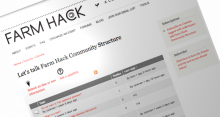Food Solutions New England (FSNE) is a regional food systems learning-action network dedicated to advancing a sustainable New England food system. The FSNE network is organized around four interrelated activities:
A New England Food Vision, a bold vision that calls for our region to build the capacity to produce up to 70% of food that is produced in an environmentally and socially sustainable manner, that promotes health and is accessible by all New Englanders by 2060; New England state food planning initiatives; annual New England food summits and topical workshops; and related analysis, communication and visualization.
The UNH Sustainability Institute serves as the backbone organization for FSNE. Since its inception in 2006, FSNE has advanced its mission by linking a common agenda, shared measurement, continuous communication, and synergestic activities.




One of the prerequisites for sharing and integrating data across actual and intellectual silos, and within larger decision making frameworks, are consistent and well documented open standards for creating/structuring and sharing/publishing that data. Here at Mann Library we've been working on that issue through our development of the VIVO network, which has evolved to include the USDA, and now internationally as AgriVIVO, using and extending the VIVO ontology (https://wiki.duraspace.org/display/VIVO/VIVO+Ontology). In several cases we've been able to capitalize on Drupal’s ability to both publish and ingest “linked data” like that generated through the [VIVO network](see http://impact.cals.cornell.edu/).
Related efforts like the Open Food Data and the Coherence in Information for Agricultural Research for Development movements are working on this as well. Once we have agreed upon standards, it becomes much easier to develop shared tools and networks for using and repurposing data. This is illustrated through the explosion of easy to use GIS tools as the result of Geospatial Web Services.
I'd love to see the Farm Hack community take this up in earnest, perhaps partnering with NESAWG on our Food Knowledge Ecosystem project, and others like AgSquared, and Public Lab.